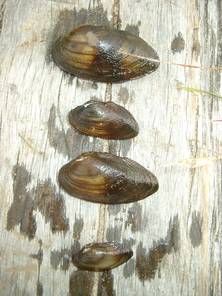US reseachers studying how mussels anchor themselves to rocks, stones and jetties have stumbled upon a trick that can chemically coat any surface with something so sticky that it will even bind to Teflon.
 When Phillip Messersmith and his team at Northwestern University analysed the mussel glue they found it to be very rich in a chemical called DOPA (di-hydroxy phenylalanine), together with an amino acid building block called lysine. These two molecules interact to give the glue its sticking power. So the researchers wondered whether other molecules, containing the same chemical groups, might behave in the same way when exposed to seawater. To find out, they used the substance dopamine, which is used in the body as a nerve transmitter but also contains both a catechol group, like DOPA, and an amino group, like lysine. Incredibly, the trick worked. When a small amount of dopamine was dissolved in water and then the water was made slightly alkaline like the sea, the dopamine molecules linked up to form polymers. If an object was added to the solution as this process was taking place an ultrathin layer of the polymer just 50nm thick (1000 times thinner than a human hair) was deposited on the surface, which then behaved as a "key" to which other substances could be attached. By dipping treated objects into a solution containing copper or silver ions it was possible to metal plate the material, producing electrically conductive plastics.
When Phillip Messersmith and his team at Northwestern University analysed the mussel glue they found it to be very rich in a chemical called DOPA (di-hydroxy phenylalanine), together with an amino acid building block called lysine. These two molecules interact to give the glue its sticking power. So the researchers wondered whether other molecules, containing the same chemical groups, might behave in the same way when exposed to seawater. To find out, they used the substance dopamine, which is used in the body as a nerve transmitter but also contains both a catechol group, like DOPA, and an amino group, like lysine. Incredibly, the trick worked. When a small amount of dopamine was dissolved in water and then the water was made slightly alkaline like the sea, the dopamine molecules linked up to form polymers. If an object was added to the solution as this process was taking place an ultrathin layer of the polymer just 50nm thick (1000 times thinner than a human hair) was deposited on the surface, which then behaved as a "key" to which other substances could be attached. By dipping treated objects into a solution containing copper or silver ions it was possible to metal plate the material, producing electrically conductive plastics.
The team hope that the discovery will make it possible to produce body implants and medical implants, such as silver-coated catheters, which have anti-bacterial qualities. It has even been possible to use the technique to remove heavy metal contamination from drinking water.
"We were able to remove mercury from water by passing it down a column containing beads treated with our polydopamine coating," says Messersmith. "So this could be very useful in cleaning up water in countries with heavy metal pollution."










Comments
Add a comment